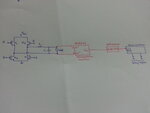zizi110
Member level 1

- Joined
- Jun 24, 2013
- Messages
- 41
- Helped
- 0
- Reputation
- 0
- Reaction score
- 0
- Trophy points
- 6
- Activity points
- 313
Hi all,
i am designing closed loop system that consist of a dc-ac converter(inverter) and a controller,
i want to control output voltage of inverter by means of feedback voltage that goes to microcontroller ADC. in micro i have a C code that is my controller algorithm.
my supervisor said that i should use instrumentation amplifier for voltage feedbacking.
but i dont know ... i guess may be there is problem with isolation between power stage and microcontroller,
there are instrumentation amplifier like op184/284/484, but my question is the isolation issue between inverter and micro.
is it necessary to use optocoupler for isolation or not?
thanks for your time.
i am designing closed loop system that consist of a dc-ac converter(inverter) and a controller,
i want to control output voltage of inverter by means of feedback voltage that goes to microcontroller ADC. in micro i have a C code that is my controller algorithm.
my supervisor said that i should use instrumentation amplifier for voltage feedbacking.
but i dont know ... i guess may be there is problem with isolation between power stage and microcontroller,
there are instrumentation amplifier like op184/284/484, but my question is the isolation issue between inverter and micro.
is it necessary to use optocoupler for isolation or not?
thanks for your time.




